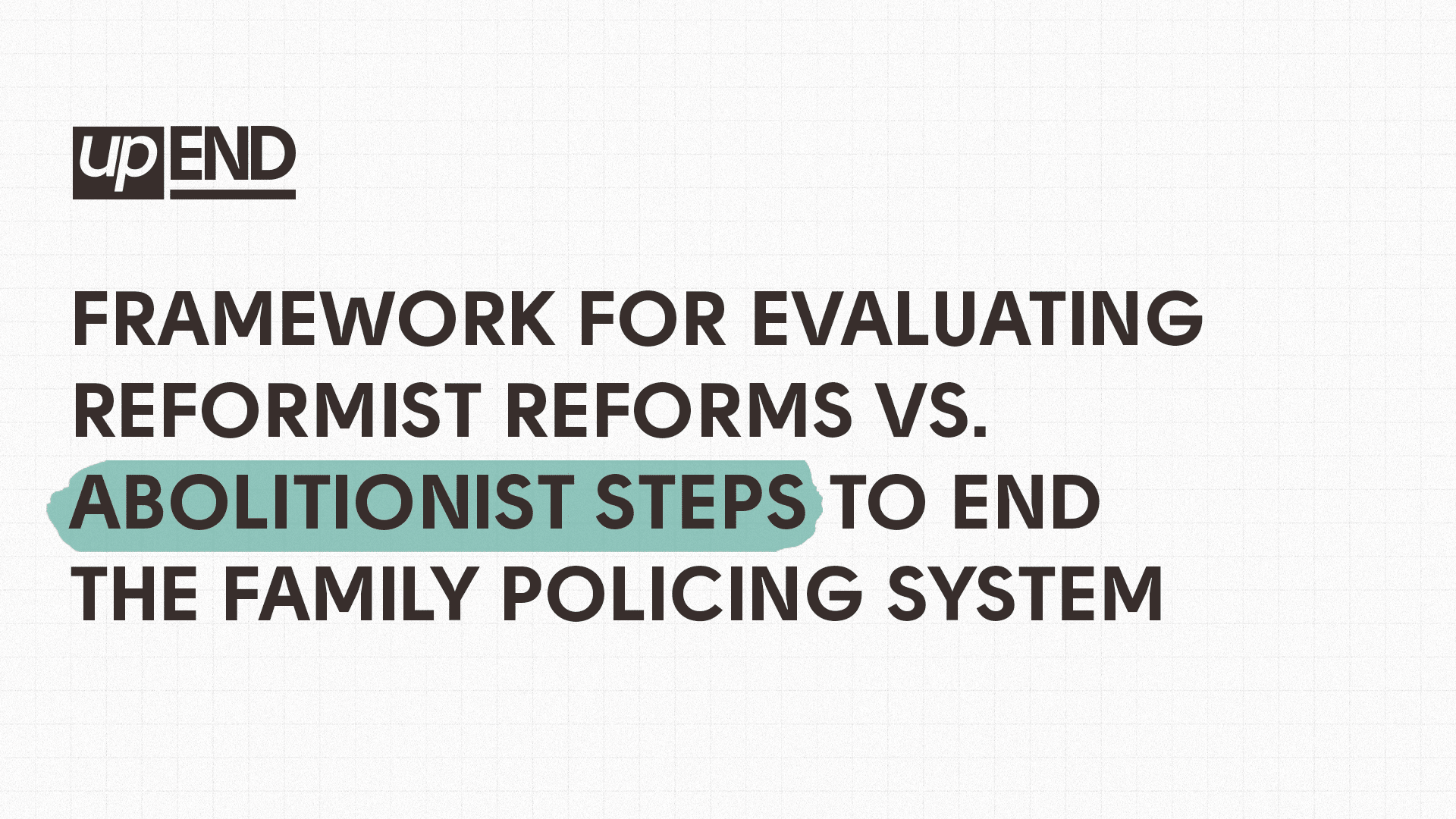Abolitionist Steps to Build a Better World
March 22, 2023
March 22, 2023

Authors: Maya Pendleton and Alan Dettlaff


In 2020, during the peak of the summer uprisings in response to the public executions of George Floyd, Breonna Taylor, and others murdered by the state, abolition as a means to end state violence grew roots in conversations about policing in the United States. Prison abolitionists have been working to end policing and prisons throughout the history of the United States, yet in 2020, abolition drifted from the margins to the forefront of public discourse. But, as Micah Herskind writes, abotiltion’s ascent into public discourse was followed by “swift pushback, counterinsurgency, and co-optation.” Rather than support abolitionist efforts that seek to directly address the state and its readiness to inflict harm and violence on “certain people in certain places,” reform quickly re-emerged as the primary, acceptable method to combat “police brutality,” violence in policing, and/or “out of control” officers, but not the system of policing itself.
Masked as efforts to address state violence in the form of policing, reforms such as the George Floyd Justice in Policing Act and the #8Can’tWait campaign manipulated the momentum, and in some cases, the language of abolitionists to promote reformist strategies in order to adjust isolated aspects of policing while safeguarding policing from being eliminated altogether. Similarly, as abolitionists also began to firmly situate the family policing system within policing and as a carceral system, calls to end family policing all together were met with calls to reform family policing into a more competent yet equally harmful system.
Presumably, reforms to the family policing system should address both the system’s embedded racism and the harm the system causes to the children and families with whom it intervenes. Yet most do not. From increasing diversity, to providing the workforce with better training, to changing policies and practices, reforms to family policing closely mirror proposals to reform policing. Reforms provide tweaks and adjustments to the day-to-day work of family policing but provide no real long-term solution to end state harm. Reforms are ineffective at combating racism and harm in part because they do not intend to, but also because they begin with the wrong presumptions. That is, reforms try to answer questions such as “how can family policing work better for children and families?” or “how can social workers separate families in ways that are less harmful?” instead of asking larger questions such as “why do families need to be policed at all, and who decided policing was helpful?”
Abolition demands that we ask better questions that get to the root of the real problems–questions that seek answers that make communities safer and allow people to exist without the threat of state harm.
Abolition is inherently inquisitive and experimental. Many, if not all, of the current systems in the society we find ourselves in were predetermined by people who sought to create a world predicated on exploitation, oppression, and harm. Building a radically new society where people are fed, housed, and safe from harm, especially state harm, requires that we ask better, or in some cases new, questions and seek answers that are rooted in community, anti-capitalism, autonomy, and liberation.
Critical Resistance, prison industrial complex (PIC) abolitionists, proposed questions (and continue to) about policing and prisons that provide a guide of how we take power away from the carceral state and begin to build a world without prisons and policing. Similarly, different questions, yet with the same goal of ending policing–in this case the policing of families–have been posed and continue to be asked by family policing abolitionists. Building on the work of both PIC abolitionists and family policing abolitionists, upEND applied Critical Resitance’s tool to a framework focused on ending family policing. The tool or framework is composed of questions to guide our steps to end family policing. The tool also allows us to see reformist reforms clearly for what they are, thus resisting reforms that arise as misleading solutions to the harm of the family policing system.
In the tool, questions are posed as outcomes made possible by the ending of family policing. If we desire to see a society where family policing cannot reach and harm children and families, we can start by asking if the steps we are taking form a society where that outcome is possible. In a world without family policing, children would be respected as autonomous beings. Similarly, families and communities would have the autonomy to be free from state intervention and create their own systems and modes of relationality. When children or families find themselves in need, they would be able to receive support and care that comes without policing. Communities would address harm and heal outside of carceral mechanisms. When the family policing system is the only well funded system through which families can attempt to seek help, teachers, neighbors, and community members are compelled to rely on this system in times of need. In other words, the family policing system is purposely constructed to be perceived as the only legitimate place to turn during conflict or hardship. Seeking to create a society where the legitimacy of the family policing system is completely diminished requires us to build alternative networks for care and support. Questioning the methods and steps we are taking in attempts to end family policing brings forth answers that point us to how we begin to build a better society. This is the work we do together–liberatory work that asks us to dream of and build a better world.
The pushback abolitionists receive is often rooted in the claim that abolition is idealistic or impossible. While it might seem impossible to ask new questions and to build a society we have never seen before, reforms are recycled and repackaged in response to state violence in ways that consistently prove unable to meet their intended goal of reducing state violence. Reforms have been tried repeatedly with little success. It is both idealistic and impossible to believe that reforms will lead to profoundly different systems and even more impossible to believe that reforms will improve the relationship Black communities and other communities of color have with policing. Yet, the “idealists” have produced concrete changes. Abolitionist organizers have and continue to successfully feed communities through mutual aid networks, create political education programs within the confines of prisons, and lead prison rebellions despite state repression. Abolitionist strategies and tactics are successful because they seek and use methods that intend to produce different outcomes. The questions in this tool guide us to choose these strategies–strategies that will lead to the end of family policing. Together, we can leave reform behind and take abolitionists steps to build a better world.